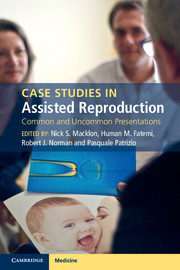20 results
12B - The Endometrial Scratch Has Had Its Day
- from Section II - IVF Add-ons
-
-
- Book:
- 50 Big Debates in Reproductive Medicine
- Published online:
- 25 November 2021
- Print publication:
- 16 December 2021, pp 65-67
-
- Chapter
- Export citation
Chapter 14 - Preconception Lifestyle Modification of Decidua to Decrease Early Pregnancy Loss: Feeding the Endometrium
-
-
- Book:
- How to Improve Preconception Health to Maximize IVF Success
- Published online:
- 08 February 2018
- Print publication:
- 22 February 2018, pp 131-142
-
- Chapter
- Export citation
2 - Decidualization and Recurrent Miscarriage
-
-
- Book:
- Early Pregnancy
- Published online:
- 16 February 2017
- Print publication:
- 02 February 2017, pp 13-17
-
- Chapter
- Export citation
Case Studies in Assisted Reproduction - Half title page
-
- Book:
- Case Studies in Assisted Reproduction
- Published online:
- 05 February 2015
- Print publication:
- 22 January 2015, pp i-ii
-
- Chapter
- Export citation
Copyright page
-
- Book:
- Case Studies in Assisted Reproduction
- Published online:
- 05 February 2015
- Print publication:
- 22 January 2015, pp iv-iv
-
- Chapter
- Export citation
25 - Fluid in the endometrial cavity during IVF treatment
-
-
- Book:
- Case Studies in Assisted Reproduction
- Published online:
- 05 February 2015
- Print publication:
- 22 January 2015, pp 85-89
-
- Chapter
- Export citation
Case Studies in Assisted Reproduction - Title page
-
-
- Book:
- Case Studies in Assisted Reproduction
- Published online:
- 05 February 2015
- Print publication:
- 22 January 2015, pp iii-iii
-
- Chapter
- Export citation
3 - Increased risk of venous thromboembolism (VTE)
-
-
- Book:
- Case Studies in Assisted Reproduction
- Published online:
- 05 February 2015
- Print publication:
- 22 January 2015, pp 12-15
-
- Chapter
- Export citation
Index
-
- Book:
- Case Studies in Assisted Reproduction
- Published online:
- 05 February 2015
- Print publication:
- 22 January 2015, pp 209-215
-
- Chapter
- Export citation

Case Studies in Assisted Reproduction
- Common and Uncommon Presentations
-
- Published online:
- 05 February 2015
- Print publication:
- 22 January 2015
Abbreviations
-
- Book:
- Case Studies in Assisted Reproduction
- Published online:
- 05 February 2015
- Print publication:
- 22 January 2015, pp xvii-xx
-
- Chapter
- Export citation
Contents
-
- Book:
- Case Studies in Assisted Reproduction
- Published online:
- 05 February 2015
- Print publication:
- 22 January 2015, pp v-viii
-
- Chapter
- Export citation
Preface
-
- Book:
- Case Studies in Assisted Reproduction
- Published online:
- 05 February 2015
- Print publication:
- 22 January 2015, pp xv-xvi
-
- Chapter
- Export citation
Contributors
-
-
- Book:
- Case Studies in Assisted Reproduction
- Published online:
- 05 February 2015
- Print publication:
- 22 January 2015, pp ix-xiv
-
- Chapter
- Export citation
Contributors
-
-
- Book:
- How to Improve your ART Success Rates
- Published online:
- 05 July 2011
- Print publication:
- 30 June 2011, pp viii-xii
-
- Chapter
- Export citation
Chapter 44 - Psychological perspectives on IVF treatment
- from Section 7 - Ancillary treatments
-
-
- Book:
- How to Improve your ART Success Rates
- Published online:
- 05 July 2011
- Print publication:
- 30 June 2011, pp 221-225
-
- Chapter
- Export citation
Contributors
-
-
- Book:
- Human Assisted Reproductive Technology
- Published online:
- 16 May 2011
- Print publication:
- 31 March 2011, pp ix-xii
-
- Chapter
- Export citation
Chapter 6 - New concepts in ovarian stimulation
-
-
- Book:
- Human Assisted Reproductive Technology
- Published online:
- 16 May 2011
- Print publication:
- 31 March 2011, pp 54-72
-
- Chapter
- Export citation
Chapter 20 - Recurrent implantation failure
-
-
- Book:
- Early Pregnancy
- Published online:
- 05 October 2010
- Print publication:
- 09 September 2010, pp 213-226
-
- Chapter
- Export citation
Contributors
-
-
- Book:
- Early Pregnancy
- Published online:
- 05 October 2010
- Print publication:
- 09 September 2010, pp vii-x
-
- Chapter
- Export citation



